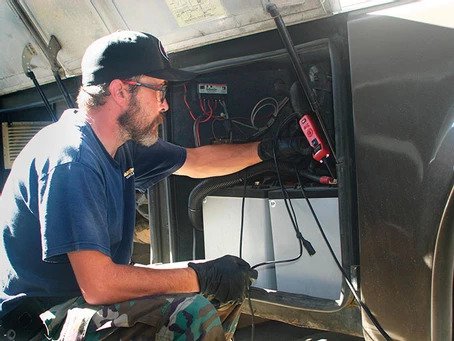How to Build the Right Team for Your Mobile Health Program
Your patients depend on you. With the right team, you can deliver the care that they need. Follow these tips when planning your mobile healthcare...
3 min read
 Travis LeFever
Sep 16, 2020 4:30:00 AM
Travis LeFever
Sep 16, 2020 4:30:00 AM

When I was a kid, maybe in the 3rd or 4th grade, we had one of those phones in our house with the 25' long cord. You probably had one, where you could walk all over the house and still talk?
And I remember my dad answering the phone one night, saying "Hello," and "Yes, this is Mr. LeFever," and as he was listening to whoever it was, walking down the hall over to where I was sitting on the couch, and just standing in front of me, staring at me, chewing his bottom lip as he listened.
I had no idea what was going on but it couldn't be good, could it? You know what it was? My teacher. He had been invited to a special "parent-teacher conference." Yippee for all involved, right?
Apparently my teacher didn't appreciate my love of reading. Or more specifically, the fact that I was hiding books in my desk and instead of listening to her teach, I would read them in my lap the entire time she was trying to teach. Reading was my escape from boredom, from her, to be honest. She was unbelievably boring.
In any event, I've always been interested in reading, and words. As a professional I've become interested in the word Warranty and the word Guarantee and I've learned they stem from the same root.
The root of both words is the Old French word garantie, which comes from the verb garantir, meaning “to protect,” “to warrant,” or “to guarantee.”
I've also learned that the majority of warranties (especially in the specialty vehicles & mobile clinic industry) have a large gap between the promise and the performance.
Almost every company must offer a warranty to compete in the marketplace, But once they make the sale, they aren't required to perform well. In fact, many companies "giveth" with one hand, and "taketh" with the other.
Three examples of this gap:
1. The Swiss Cheese Warranty:
A Warranty looks good and sounds great until you notice the word "Limited" and the laundry list of things that are "excluded." You may want to ask these companies (as my good friend Eliot used to say,) -- "You know I can read, right?"
2. The Empty Box Warranty:
A Warranty that isn't full of holes (which means the company has good intentions) but when it comes to performance they falter. Small companies often have cash-flow crunches, especially with COVID-19, and no matter how much they would like to stand behind their work, they can't.
3. The Blame the Customer Warranty:
This one makes me mad. This one is where the company ownership writes a strong warranty, but when the time comes to stand up, rather than accepting responsibility for the warranty issues they blame the customer. "You broke it." or "What did you do?" or "That's not our fault." are popular refrains from these trolls.
A sham is defined as ‘the failure to perform upon self-imposed, publicly proclaimed commitments’. Some warranties are a sham.
It is possible that a more fitting name for a ‘sham’ warranty would be an ‘aspirational warranty’.
If length, scope and strength of the Warranty is a heavily weighted buying criteria for you and your team, the space you want to really examine is the space between promise and performance: the ‘focus is entirely upon observable behavior, and only the extent where compliance or violation matters’.
In other words, if a mobile clinic manufacturer isn't guaranteeing the expensive parts (body, drive train, etc.) it's worthless. Your program can afford to replace a $500 part. You can't afford a $30,000 engine.
This unregulated aspect of the mobile clinic industry justifies a distinction being drawn between warranties that promise much and warranties that promise little, and the ultimate sham - the warranty that promises much but delivers nothing.
The world is filled with promises from creatives, politicians, business leaders, teachers, even religious figures and mobile clinic manufacturers. In the heat of negotiating a deal, interviewing for a new job, or pitching a project, we tend to over-promise. The goal is to just get the gig. But when it comes to actual performance – as the TV commercials say, “results my vary.”
So how do buyers close the gap? How do you make sure a vendor, like Mission Mobile for example, delivers on our promises? Here’s a few important keys to make it happen for you:
1. Read: Requests and read the manufacturer's' warranty. Is it simple? Clear? Do they declare their intent for you to be satisfied? Or is that intent suspiciously absent?
My personal rule is "The more legal language you see in a warranty, the more likely it is a lawyer drafted it." Which means the less likely you are to be satisfied if and when push comes to shove.
2. Ask Questions: Ask about standard scenarios. For example, "What if the roof leaks and damages our equipment? What happens?" or "What if a tire blows? What happens next?"
If vendors waffle on answers, or say "Wellll, it depends...," and proceed to beat around the bush about things, that's a big red flag.
2. Listen closely: People will tell you who they are. Believe them.
It's not difficult to discern how you'll be treated. Is there a Warranty? Are they proud of it, or do they hide it? Are they open about discussions? Is it negotiable? Does their marketing materials reference their core values? Do they talk about their ethics and values?
My dad used to tell me, "Travis, you have to treat your customers like you'd want another man to treat your family." It's as plain as the nose on your face where there is a gap between promise and performance, and which companies will treat you like family.
And how did that parent-teacher conference turn out? Mrs. McGrath simply wanted the best for me and made it pretty clear I needed to close the gap between my promise and my performance.
She'd be happy to know I learned my lesson.

Your patients depend on you. With the right team, you can deliver the care that they need. Follow these tips when planning your mobile healthcare...

Looking for the best way to market your mobile medical clinic? We’ve got you covered. Read on for the best tips on how to market your mobile health...

Learn actionable tips for turning your vision for a mobile dental clinic into a reality. This guide will walk you through every step to start and run...